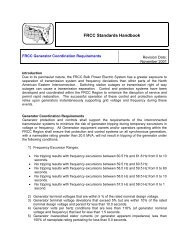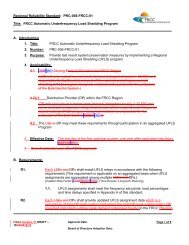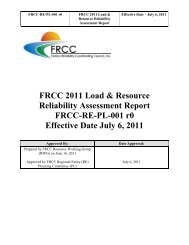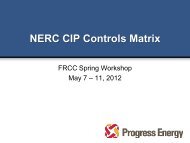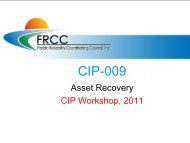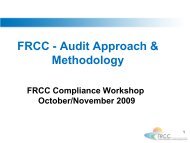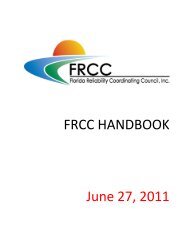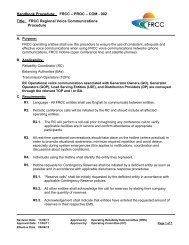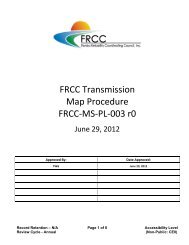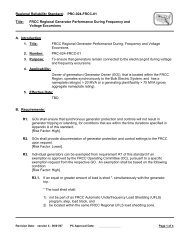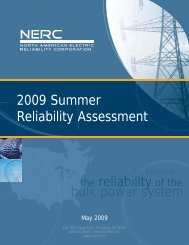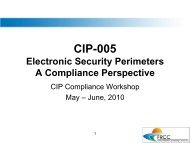- Page 1 and 2:
2009 Scenario ReliabilityAssessment
- Page 3 and 4:
Table of ContentsTable of ContentsN
- Page 5 and 6:
Executive SummaryTransmission Criti
- Page 8 and 9:
Background Information for this Rep
- Page 10:
Scenario Reliability Assessment Sum
- Page 13 and 14:
Scenario Reliability Assessment Sum
- Page 16 and 17:
Scenario Reliability Self-Assessmen
- Page 18 and 19:
Scenario Reliability Self-Assessmen
- Page 20 and 21:
Scenario Reliability Self-Assessmen
- Page 22 and 23:
Scenario Reliability Self-Assessmen
- Page 24 and 25:
Scenario Reliability Self-Assessmen
- Page 26 and 27:
Scenario Reliability Self-Assessmen
- Page 28 and 29:
Scenario Reliability Self-Assessmen
- Page 30 and 31:
Scenario Reliability Self-Assessmen
- Page 32 and 33:
Scenario Reliability Self-Assessmen
- Page 34 and 35:
Scenario Reliability Self-Assessmen
- Page 36 and 37:
Scenario Reliability Self-Assessmen
- Page 38 and 39:
Scenario Reliability Self-Assessmen
- Page 40 and 41:
Scenario Reliability Self-Assessmen
- Page 42 and 43:
Scenario Reliability Self-Assessmen
- Page 44 and 45:
Scenario Reliability Self-Assessmen
- Page 46 and 47:
Scenario Reliability Self-Assessmen
- Page 48 and 49:
Scenario Reliability Self-Assessmen
- Page 50 and 51:
Scenario Reliability Self-Assessmen
- Page 52 and 53:
Scenario Reliability Self-Assessmen
- Page 54 and 55:
Scenario Reliability Self-Assessmen
- Page 56 and 57:
Scenario Reliability Self-Assessmen
- Page 58 and 59:
Scenario Reliability Self-Assessmen
- Page 60 and 61:
Scenario Reliability Self-Assessmen
- Page 62 and 63:
Scenario Reliability Self-Assessmen
- Page 64 and 65:
Scenario Reliability Self-Assessmen
- Page 66 and 67:
Scenario Reliability Self-Assessmen
- Page 68 and 69:
Scenario Reliability Self-Assessmen
- Page 70 and 71:
Scenario Reliability Self-Assessmen
- Page 72 and 73:
Scenario Reliability Self-Assessmen
- Page 74 and 75:
Scenario Reliability Self-Assessmen
- Page 76 and 77:
Scenario Reliability Self-Assessmen
- Page 78 and 79:
Scenario Reliability Self-Assessmen
- Page 80 and 81:
Scenario Reliability Self-Assessmen
- Page 82 and 83:
Scenario Reliability Self-Assessmen
- Page 84 and 85:
Scenario Reliability Self-Assessmen
- Page 86 and 87:
Scenario Reliability Self-Assessmen
- Page 88 and 89:
Scenario Reliability Self-Assessmen
- Page 90 and 91:
Scenario Reliability Self-Assessmen
- Page 92 and 93:
Scenario Reliability Self-Assessmen
- Page 94 and 95:
Scenario Reliability Self-Assessmen
- Page 96 and 97:
Scenario Reliability Self-Assessmen
- Page 98 and 99:
Scenario Reliability Self-Assessmen
- Page 100 and 101:
Scenario Reliability Self-Assessmen
- Page 102 and 103:
Scenario Reliability Self-Assessmen
- Page 104 and 105:
Scenario Reliability Self-Assessmen
- Page 106 and 107:
Scenario Reliability Self-Assessmen
- Page 108 and 109:
Scenario Reliability Self-Assessmen
- Page 110 and 111:
Scenario Reliability Self-Assessmen
- Page 112 and 113: Scenario Reliability Self-Assessmen
- Page 114 and 115: Scenario Reliability Self-Assessmen
- Page 116 and 117: Scenario Reliability Self-Assessmen
- Page 118 and 119: Scenario Reliability Self-Assessmen
- Page 120 and 121: Scenario Reliability Self-Assessmen
- Page 122 and 123: Scenario Reliability Self-Assessmen
- Page 124 and 125: Scenario Reliability Self-Assessmen
- Page 126 and 127: Scenario Reliability Self-Assessmen
- Page 128 and 129: Scenario Reliability Self-Assessmen
- Page 130 and 131: Scenario Reliability Self-Assessmen
- Page 132 and 133: Scenario Reliability Self-Assessmen
- Page 134 and 135: Scenario Reliability Self-Assessmen
- Page 136 and 137: Scenario Reliability Self-Assessmen
- Page 138 and 139: Scenario Reliability Self-Assessmen
- Page 140 and 141: Scenario Reliability Self-Assessmen
- Page 142 and 143: Scenario Reliability Self-Assessmen
- Page 144 and 145: Scenario Reliability Self-Assessmen
- Page 146 and 147: Scenario Reliability Self-Assessmen
- Page 148 and 149: Scenario Reliability Self-Assessmen
- Page 150 and 151: Scenario Reliability Self-Assessmen
- Page 152 and 153: Scenario Reliability Self-Assessmen
- Page 154 and 155: Scenario Reliability Self-Assessmen
- Page 156 and 157: Scenario Reliability Self-Assessmen
- Page 158 and 159: Scenario Reliability Self-Assessmen
- Page 160 and 161: Scenario Reliability Self-Assessmen
- Page 164 and 165: Regional Reliability Scenario Self-
- Page 166 and 167: Regional Reliability Scenario Self-
- Page 168 and 169: Regional Reliability Scenario Self-
- Page 170 and 171: Regional Reliability Scenario Self-
- Page 172 and 173: Regional Reliability Scenario Self-
- Page 174 and 175: Regional Reliability Scenario Self-
- Page 176 and 177: Regional Reliability Scenario Self-
- Page 178 and 179: Regional Reliability Scenario Self-
- Page 180 and 181: About This Reporto Nuclear scenario
- Page 182 and 183: Joint Coordinated System PlanThemat
- Page 184 and 185: Joint Coordinated System Plan2009 S
- Page 186 and 187: Scenario LetterScenario LetterDecem
- Page 188 and 189: Scenario LetterIn an effort to add
- Page 190 and 191: Scenario Letterd) Provide a table,
- Page 192 and 193: Reliability Assessment Subcommittee
- Page 194 and 195: Reliability Assessment Subcommittee
- Page 196: the reliability of theto ensurebulk



